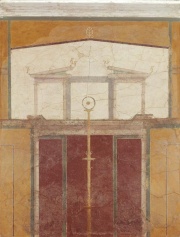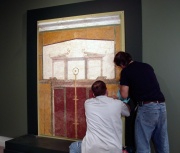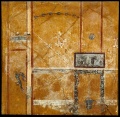Buon fresco
Description
A wall painting technique in which dry pigments are ground with Water then brushed onto wet Lime plaster. As the pigmented lime dries, the Calcium hydroxide reacts with Carbon dioxide to form a pigmented Calcium carbonate layer. Fresco paintings have survived from the Minoan period (1700 BCE) and Pompeii (79 CE). Fresco paintings were widely used from the 13th century in Italy for interior wall decorations, particularly in churches.
See also Fresco pigments.
Synonyms and Related Terms
frescoes; Freskomalerei (Deut.); Frischmalerei (Deut.); fresque (Fr.); affresco (It.); freasco (Ned.); fresk (Pol., Sven.); afresco (Port.); frescã (Rom.); freskomålning (Sven.)
Hazards and Safety
Damaged by moisture
Additional Images
Authority
- Reed Kay, The Painter's Guide To Studio Methods and Materials, Prentice-Hall, Inc., Englewood Cliffs, NJ, 1983
- Ralph Mayer, A Dictionary of Art Terms and Techniques, Harper and Row Publishers, New York, 1969 (also 1945 printing)
- The Dictionary of Art, Grove's Dictionaries Inc., New York, 1996 Comment: "Fresco"




